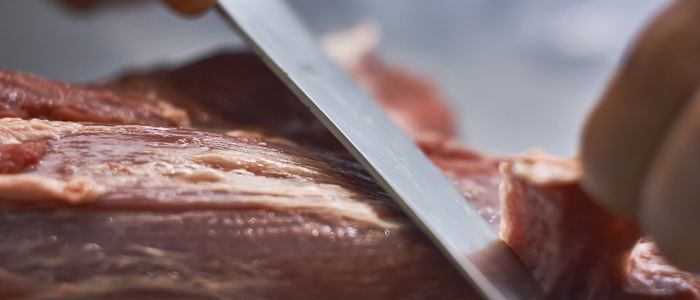How to choose the best butchers knife
Business in your shop can run smoother if you have a high-quality butcher knife to get the job done — from the first slice in the wee hours of the morning to the very last cut in the evening before heading home.
It is important to know that butchers knives are not ‘one-size-fits-all’ — some people might find one knife to fit perfectly in their hand, while others may find the same knife to be too small or bulky.
To help you through the process we have outlined five key things you should consider before you purchase a new butchers knife.
Purpose
Before purchasing a new knife either to replace old ones or to add to your set it is best to think about — why you need it.You may want to consider purchasing a higher quality of knife if you need to do a range of jobs, like cutting, slicing, or fine preparing meat.
Whereas others may need a knife for a specific purpose, like preparing perfect cuts of steak for display in the case. Or you might even need a knife specifically for boning, slicing kebabs, or even slicing thin fillets!

No matter, what you need it for — we have a butchers knife to get the job done!
Weight
Once you have decided the purpose of the knife it is important to think about the weight of it. Are you looking for a butchers knife that feels heavy or sturdy? Or do you want a knife that feels light and manoeuvrable?
Our recommendation is to weigh at least one of your favourite knives of a similar type or length on a scale to give you an idea of its weight. From there you will know which is best for your job and what already fits with your personal preference.
All of our knives should have a section in the product description which outlines all of the details of the knife including the product weight.
Balance
We typically find the balance of a new knife to be a commonly overlooked aspect of the purchasing decision. The best way to check the balance of a knife is to take it by the handle — does it feel weighted toward the handle or the blade? If so, you might need to select a different knife because an unbalanced butchers knife will make you work a lot harder.
Additionally, you should consider the balance from side-to-side — when chopping does the knife seem to favour one side? Is it the way you cut with the knife or is it the knife not quite right for your purposes?
Size
Consider what size meat will you be cutting or slicing with this new knife? Does your butcher shop specialise in fine cuts from chicken, grouse, game, beef, sausage, pork or lamb? Or all of the above? If so you might want to opt for a knife that has a medium-sized blade, around 8”, to work well with a large range of those animals.
However, if your shop specialises in small animals like lamb, chicken, grouse or turkey it might be better to consider a smaller knife. This way you have more flexibility and can more easily cut delicate slices. Smaller butchers knives are equally useful if your shop offers ready meals, BBQ packs, or other meal kits which you might need to prepare using your new knife.

Durability and Materials
When it comes to durability and materials it is important to consider what the handle is made of, the grade of steel (particularly if going stainless), and the Rockwell Hardness Rating (if provided).
By selecting a knife made from good quality steel, with a sturdy handle, and one that ranks somewhere around 60 on the Rockwell scale will ensure your new knife will last for years to come!
If you are just starting in the industry or have a strict budget to replace knives — we stock a range to meet your needs at every price point — many knives can even be sold at a bulk discount!
There are many modern butcher’s knives to get the job done! At Butcher’s Equipment Warehouse, we stock a range of reliable butchers knives to meet your needs! With us, you’ll find everything you need to keep providing top-quality meat while operating at peak efficiency. And if you’ve got any questions or need any advice, feel free to give our friendly team a call on 01254 427721.




